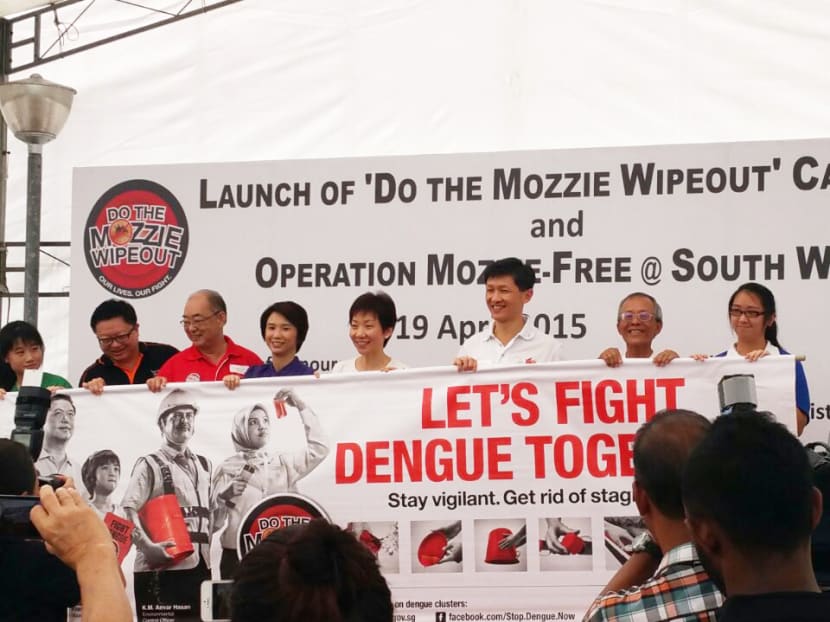Fewer cases but dengue still a threat: Grace Fu
SINGAPORE — As the number of dengue cases in the first three months of the year has fallen compared with the same period last year, there must be no let-up in vigilance as the traditional peak season for the disease approaches, said Second Minister for the Environment and Water Resources Grace Fu today (April 19).
SINGAPORE — Even as the number of dengue cases in the first three months of the year has fallen compared to the same period last year, there must be no let-up in vigilance as the traditional peak season for the disease approach, said Second Minister for the Environment and Water Resources Grace Fu today (April 19).
Her caution that dengue remains a threat comes as the number of breeding habitats for Aedes mosquito — the species responsible for transmitting dengue — found in homes rocketed by about 80 per cent in the last two months.
“An increase in Aedes mosquitoes due to more breeding habitats could lead to a surge in dengue cases in the next few months as we enter the traditional peak season,” said Ms Fu, at the launch of the “Do the Mozzie Wipeout” campaign.
The warmer months of June to October typically bring higher rates of dengue because the conditions accelerate the breeding and maturation cycles for the Aedes mosquitoes and shorter incubation periods for the dengue virus. From January to March this year, there were 2,159 reported cases of dengue — a 39 per cent decrease from the 3,557 cases over the same period last year.
Apart from keeping up with measures, such as search and destroy checks for mosquito breeding sites, Ms Fu said a tender for consultants to assess the potential environmental and social impact from using the biological control method of using Wolbachia-carrying male mosquitoes to suppress the Aedes mosquito population just closed on Thursday.
Last year, the National Environment Agency (NEA) said it had been conducting laboratory studies on the strategy, which involves infecting male Aedes mosquitoes with Wolbachia — a naturally-occurring bacterium found in more than 60 per cent of insect species. When an infected male Aedes mosquito mates with a female, the eggs produced do not hatch, keeping the mosquito population at a level where dengue transmission cannot be sustained.
A Dengue Expert Advisory Panel appointed last year to provide independent professional advice on new technologies and methods for dengue prevention and control had emphasised that the implementation of such new tools should not preclude continuation of the ongoing surveillance and mosquito control efforts.
Today, Ms Fu said stakeholders, such as academics and nature groups, will be consulted to provide a diversity of perspectives on the impact assessment of the biological control method.
“Where necessary, the study will also identify appropriate and effective mitigation and corresponding monitoring measures to minimise and forewarn of any possible undesirable consequences,” she added.
Nevertheless, while the NEA explores the potential of the Wolbachia technology, the Government cannot eliminate all mosquito breeding habitats on their own, noted Ms Fu.
Singaporeans need to do their part so that the overall dengue control efforts will be effective, she added. “All of us have an important role to keep the cases down,” she said, citing the example of neighbours reminding each other to empty stagnant water in potted plants. “We need to recognise that dengue remains a persistent threat to us as we live in a dengue endemic region.”
For dengue control, the NEA deploys about 850 officers daily to search and destroy mosquito breeding habitats. More than 3.5 million inspections were carried out last year and over 18,400 breeding sites were destroyed.
Focus will continue to be zeroed in on areas that have “higher potential for dengue transmission, particularly construction sites”, said Ms Fu.
Last year, the NEA detected mosquito breeding in 7.5 per cent of the 11,700 inspections conducted at construction sites, resulting in over 1,100 Notices to Attend Court, more than 130 Stop Work Orders and more than 60 contractors prosecuted for repeat offences.







